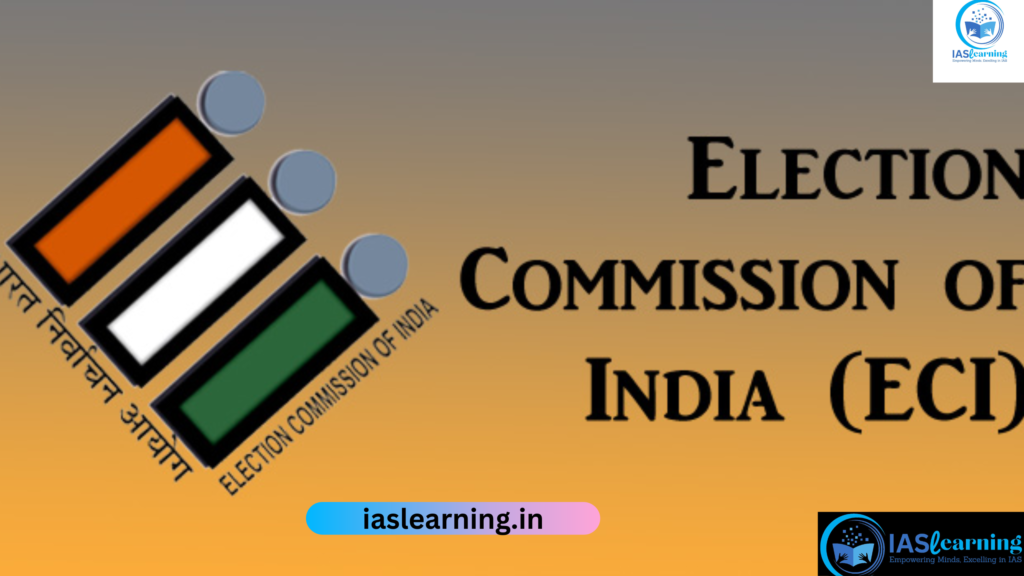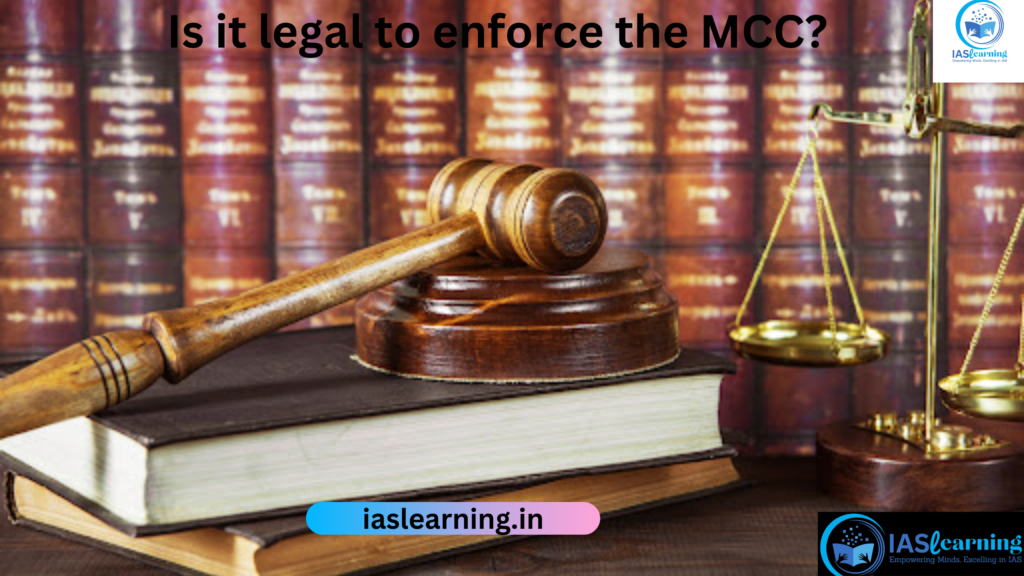MCC(Model Code of Conduct): What is it?
About:
The MCC(Model Code of Conduct) is a collection of rules that the ECI released in order to control political parties and candidates before elections.
It supports EC in accordance with the authority granted to it by Article 324 of the Constitution, which grants it the authority to oversee and manage fair and impartial elections for the State Legislatures and the Parliament.
From the day the election schedule is released until the day the results are made public, the MCC is in operation.
Evolution:
- The State administration created a “Code of Conduct” for politicians in advance of the Kerala Assembly elections in 1960, which is where the MCC got its start.
- The code was then sent by the ECI to all recognized political parties and State governments before of the 1962 Lok Sabha elections, and it was strictly adhered to.
- In 1991, the EC made the decision to impose the MCC with greater rigor due to persistent electoral irregularities and corruption.
For More: Evolution of India’s Foreign Policy
Empowering Women’s Health: India’s Move Towards Cervical Cancer Prevention
MCC for Candidates and Political Parties:

Prohibitions:
- Political parties should only be criticized in relation to their work, track record, and policies and programs.
- Election-related acts including bribing or intimidating voters, disparaging candidates based on unconfirmed information, using caste and sectarian sentiments to get votes, etc., are prohibited.
Meetings:
- In order for the police to plan appropriate security, parties must notify the local police authority of the meeting’s location and schedule as soon as possible.
Processions:
- In order to prevent conflicts between two or more candidates‘ processions that follow the same route, the political parties must get in touch ahead of time.
- It is prohibited to carry and burn effigies of members of other political parties.
On election day
- On election day, only voters and those with a current EC pass are permitted entry into polling places.
- Appropriate badges or identity cards should be issued to all authorized party workers at voting places.
- Voters will get identity slips from them that are made of plain, white paper and devoid of any symbols, party names, or candidate names.
Observers:
- The electoral commission will designate observers to whom contenders may raise issues with the way the election is being conducted.
The ruling party:
- In 1979, the MCC added several limitations that controlled the behavior of the ruling party. Ministers are not allowed to utilize official apparatus or mix official trips with electoral activities.
- To increase its prospects of winning the elections, the party must refrain from utilizing public funds for advertising or official mass media to highlight its accomplishments.
- Ministers and other authorities are prohibited from announcing financial awards or making any promises regarding the construction of roads, the provision of drinking water, or other projects until the Commission announces the elections. Rest areas and public areas must be accessible to other parties, and these must not be monopolized by the party in power.
Election Manifestos:
- In order to release election manifestos for any election (Parliament/State Legislatures), political parties and candidates are required by the ECI to fulfill certain guidelines:
- Nothing that goes against the values and principles outlined in the Constitution may be found in the electoral platform.
- Political parties should refrain from making pledges that might taint the fairness of the electoral process or unduly sway voters.
- Manifestos ought to explain the reasoning behind the promises made and provide a general idea of how to raise the necessary funds.
- As stated in Section 126 of the Representation of the People Act 1951, manifestos for single- or multi-phase elections may not be issued during the prohibitory period.
For more : What is the concept of Nation and State?
What is Constitutionalism And Consitutional Morality
Is it legal to enforce the MCC?

- Despite lacking legislative support, the MCC has gained traction in the last ten years due to the EC’s stringent implementation of it.
- By citing analogous provisions in other legislation, such as the IPC 1860, CrPC 1973, and RPA 1951, certain aspects of the MCC may be enforced.
- The Standing Committee on Personnel, Public Grievances, Law and Justice suggested in 2013 that the MCC be included in the RPA 1951 and made legally obligatory.
- The ECI, however, is opposed to making it legally enforceable. It states that elections must be finished in around 45 days, a rather short time frame, and that legal processes usually take longer, therefore making it legally enforceable is not possible.
What are the MCC’s criticisms?
Incapacity to Stop Malpractices:
- The MCC has not been able to stop election malpractices such violence, intimidation of voters, hate speech, fake news, money power, booth capture, and intimidation.
- Social media platforms and new technology that facilitate the quicker and more extensive spread of propaganda and false information pose a threat to ECI as well.
Lack of Legal Enforceability:
- The MCC is solely dependent on public opinion and moral persuasion for compliance; it is not a legally enforceable instrument.
Interference with Governance:
- MCC places restrictions on social programs, public expenditures, transfers, appointments, and policy decisions.
- ECI is frequently blamed for enforcing the MCC too late or prematurely, which has an impact on public interest and development activities.
For more : American Revolution 1776, History, Causes, Timeline and its Impacts
History of the World Before 18th Century
Lack of Awareness and Compliance:
- Voters, candidates, political parties, and government officials do not generally know about it or comprehend it.
Interference with Governance:
- MCC places restrictions on social programs, public expenditures, transfers, appointments, and policy decisions.
- ECI is frequently blamed for enforcing the MCC too late or prematurely, which has an impact on public interest and development activities.
Lack of Awareness and Compliance:
- Voters, candidates, political parties, and government officials do not generally know about it or comprehend it.
